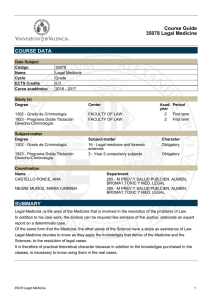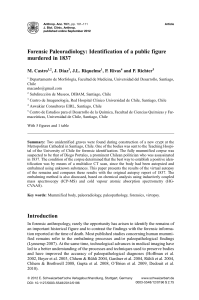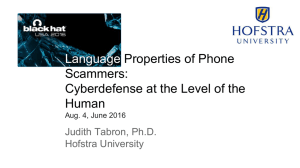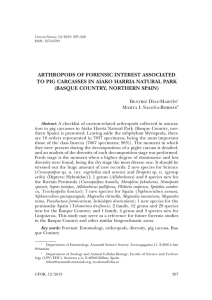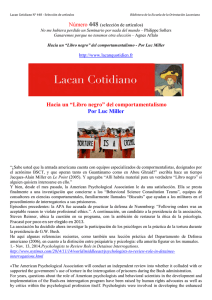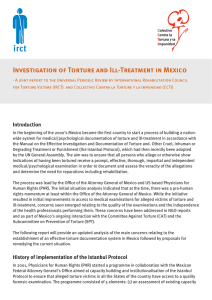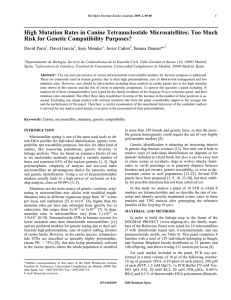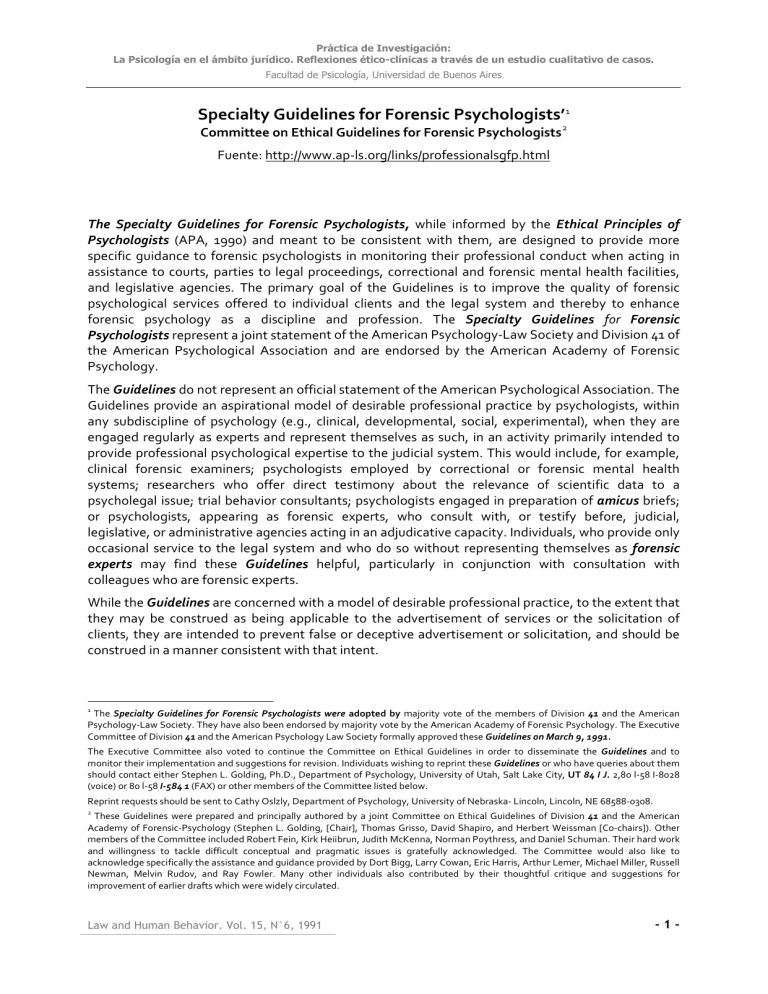
Práctica de Investigación: La Psicología en el ámbito jurídico. Reflexiones ético-clínicas a través de un estudio cualitativo de casos. Facultad de Psicología, Universidad de Buenos Aires Specialty Guidelines for Forensic Psychologists’ 1 Committee on Ethical Guidelines for Forensic Psychologists 2 Fuente: http://www.ap‐ls.org/links/professionalsgfp.html The Specialty Guidelines for Forensic Psychologists, while informed by the Ethical Principles of Psychologists (APA, 1990) and meant to be consistent with them, are designed to provide more specific guidance to forensic psychologists in monitoring their professional conduct when acting in assistance to courts, parties to legal proceedings, correctional and forensic mental health facilities, and legislative agencies. The primary goal of the Guidelines is to improve the quality of forensic psychological services offered to individual clients and the legal system and thereby to enhance forensic psychology as a discipline and profession. The Specialty Guidelines for Forensic Psychologists represent a joint statement of the American Psychology‐Law Society and Division 41 of the American Psychological Association and are endorsed by the American Academy of Forensic Psychology. The Guidelines do not represent an official statement of the American Psychological Association. The Guidelines provide an aspirational model of desirable professional practice by psychologists, within any subdiscipline of psychology (e.g., clinical, developmental, social, experimental), when they are engaged regularly as experts and represent themselves as such, in an activity primarily intended to provide professional psychological expertise to the judicial system. This would include, for example, clinical forensic examiners; psychologists employed by correctional or forensic mental health systems; researchers who offer direct testimony about the relevance of scientific data to a psycholegal issue; trial behavior consultants; psychologists engaged in preparation of amicus briefs; or psychologists, appearing as forensic experts, who consult with, or testify before, judicial, legislative, or administrative agencies acting in an adjudicative capacity. Individuals, who provide only occasional service to the legal system and who do so without representing themselves as forensic experts may find these Guidelines helpful, particularly in conjunction with consultation with colleagues who are forensic experts. While the Guidelines are concerned with a model of desirable professional practice, to the extent that they may be construed as being applicable to the advertisement of services or the solicitation of clients, they are intended to prevent false or deceptive advertisement or solicitation, and should be construed in a manner consistent with that intent. 1 The Specialty Guidelines for Forensic Psychologists were adopted by majority vote of the members of Division 41 and the American Psychology‐Law Society. They have also been endorsed by majority vote by the American Academy of Forensic Psychology. The Executive Committee of Division 41 and the American PsychoIogy Law Society formally approved these Guidelines on March 9, 1991. The Executive Committee also voted to continue the Committee on Ethical Guidelines in order to disseminate the Guidelines and to monitor their implementation and suggestions for revision. Individuats wishing to reprint these Guidelines or who have queries about them should contact either Stephen L. Golding, Ph.D., Department of Psychology, University of Utah, Salt Lake City, UT 84 I J. 2,80 l‐58 I‐8028 (voice) or 80 l‐58 I‐584 1 (FAX) or other members of the Committee listed below. Reprint requests should be sent to Cathy Oslzly, Department of Psychology, University of Nebraska‐ Lincoln, Lincoln, NE 68588‐0308. 2 These Guidelines were prepared and principally authored by a joint Committee on Ethical Guidelines of Division 41 and the American Academy of Forensic‐Psychology (Stephen L. Golding, [Chair], Thomas Grisso, David Shapiro, and Herbert Weissman [Co‐chairs]). Other members of the Committee included Robert Fein, Kirk Heiibrun, Judith McKenna, Norman Poythress, and Daniel Schuman. Their hard work and willingness to tackle difficult conceptual and pragmatic issues is gratefully acknowledged. The Committee would aIso like to acknowledge specifically the assistance and guidance provided by Dort Bigg, Larry Cowan, Eric Harris, Arthur Lemer, Michael Miller, Russell Newman, Melvin Rudov, and Ray Fowler. Many other individuals also contributed by their thoughtful critique and suggestions for improvement of earlier drafts which were widely circulated. Law and Human Behavior. Vol. 15, N°6, 1991 -1- Práctica de Investigación: La Psicología en el ámbito jurídico. Reflexiones ético-clínicas a través de un estudio cualitativo de casos. Facultad de Psicología, Universidad de Buenos Aires I. PURPOSE AND SCOPE A. Purpose 1. While the professional standards for the ethical practice of psychology, as a general discipline, are addressed in the American Psychological Association’s Ethical Principles of Psychologists, these ethical principles do not relate, in sufficient detail, to current aspirations of desirable professional conduct for forensic psychologists. By design, none of the Guidelines contradicts any of the Ethical Principles of Psychologists; rather, they amplify those Principles in the context of the practice of forensic psychology, as herein defined. 2. The Guidelines have been designed to be national in scope and are intended to conform with state and Federal law. In situations where the forensic psychologist believes that the requirements of law are in conflict with the Guidelines, attempts to resolve the conflict should be made in accordance with the procedures set forth in these Guidelines [IV(G)] and in the Ethical Principles of Psychologists. B. Scope 1. The Guidelines specify the nature of desirable professional practice by forensic psychologists, within any subdiscipline of psychology (e.g., clinical, developmental, social, experimental), when engaged regularly as forensic psychologists. a. “Psychologist” means any individual whose professional activities are defined by the American Psychological Association or by regulation of title by state registration or licensure, as the practice of psychology. b. “Forensic psychology” means all forms of professional psychological conduct when acting, with definable foreknowledge, as a psychological expert on explicitly psycholegal issues, in direct assistance to courts, parties to legal proceedings, correctional and forensic mental health facilities, and administrative, judicial, and legislative agencies acting in an adjudicative capacity. c. “Forensic psychologist” means psychologists who regularly engage in the practice of forensic psychology as defined in I (B)(1)(b). 2. The Guidelines do not apply to a psychologist who is asked to provide professional Psychological services when the psychologist was not informed at the time of delivery of the services that they were to be used as forensic psychological services as defined above. The Guidelines may be helpful, however, in preparing the psychologist for the experience of communicating psychological data in a forensic context. 3. Psychologists who are not forensic psychologists as defined in I (B)(1)(c), but occasionally provide limited forensic psychological services, may find the Guidelines useful in the preparation and presentation of their professional services. C. Related Standards 1. Forensic psychologists also conduct their professional activities in accord with the Ethical Principles of Psychologists and the various other statements of the American Psychological Association that may apply to particular subdisciplines or areas of practice that are relevant to their professional activities. 2. The standards of practice and ethical guidelines of other relevant “expert professional organizations” contain useful guidance and should be consulted even though the present Guidelines take precedence for forensic psychologists. Law and Human Behavior. Vol. 15, N°6, 1991 -2- Práctica de Investigación: La Psicología en el ámbito jurídico. Reflexiones ético-clínicas a través de un estudio cualitativo de casos. Facultad de Psicología, Universidad de Buenos Aires II. RESPONSIBILITY A. Forensic psychologists have an obligation to provide services in a manner consistent with the highest standards of their profession. They are responsible for their own conduct and the conduct of those individuals under their direct supervision. B. Forensic psychologists make a reasonable effort to ensure that their services and the products of their services are used in a forthright and responsible manner. III. COMPETENCE A. Forensic psychologists provide services only in areas of psychology in which they have specialized knowledge, skill, experience, and education. B. Forensic psychologists have an obligation to present to the court, regarding the specific matters to which they will testify, the boundaries of their competence, the factual bases (knowledge, skill, experience, training, and education) for their qualification as an expert, and the relevance of those factual bases to their qualification as an expert on the specific matters at issue. C. Forensic psychologists are responsible for a fundamental and reasonable level of knowledge and understanding of the legal and professional standards that govern their participation as experts in legal proceedings. D. Forensic psychologists have an obligation to understand the civil rights of parties in legal proceedings in which they participate, and manage their professional conduct in a manner that does not diminish or threaten those rights. E. Forensic psychologists recognize that their own personal values, moral beliefs, or personal and professional relationships with parties to a legal proceeding may interfere with their ability to practice competently. Under such circumstances, forensic psychologists are obligated to decline participation or to limit their assistance in a manner consistent with professional obligations. IV. RELATIONSHIPS A. During initial consultation with the legal representative of the party seeking services, forensic psychologists have an obligation to inform the party of factors that might reasonably affect the decision to contract with the forensic psychologist. These factors include, but are not limited to 1. the fee structure for anticipated professional services; 2. prior and current personal or professional activities, obligations, and relationships that might produce a conflict of interests; 3. their areas of competence and the limits of their competence; and 4. the known scientific bases and limitations of the methods and procedures that they employ and their qualifications to employ such methods and procedures. B. Forensic psychologists do not provide professional services to parties to a legal proceeding on the basis of “contingent fees,” when those services involve the offering of expert testimony to a court or administrative body, or when they call upon the psychologist to make affirmations or representations intended to be relied upon by third parties. C. Forensic psychologists who derive a substantial portion of their income from fee‐for‐service arrangements should offer some portion of their professional services on a pro bono or reduced fee basis where the public interest or the welfare of clients may be inhibited by insufficient financial resources. Law and Human Behavior. Vol. 15, N°6, 1991 -3- Práctica de Investigación: La Psicología en el ámbito jurídico. Reflexiones ético-clínicas a través de un estudio cualitativo de casos. Facultad de Psicología, Universidad de Buenos Aires D. Forensic psychologists recognize potential conflicts of interest in dual relationships with parties to a legal proceeding, and they seek to minimize their effects. 1. Forensic psychologists avoid providing professional services to parties in a legal proceeding with whom they have personal or professional relationships that are inconsistent with the anticipated relationship. 2. When it is necessary to provide both evaluation and treatment services to a party in a legal proceeding (as may be the case in small forensic hospital settings or small communities), the forensic psychologist takes reasonable steps to minimize the potential negative effects of these circumstances on the rights of the party, confidentiality, and the process of treatment and evaluation. E. Forensic psychologists have an obligation to ensure that prospective clients are informed of their legal rights with respect to the anticipated forensic service, of the purposes of any evaluation, of the nature of procedures to be employed, of the intended uses of any product of their services, and of the party who has employed the forensic psychologist. 1. Unless court ordered, forensic psychologists obtain the informed consent of the client or party, or their legal representative, before proceeding with such evaluations and procedures. If the client appears unwilling to proceed after receiving a thorough notification of the purposes, methods, and intended uses of the forensic evaluation, the evaluation should be postponed and the psychologist should take steps to place the client in contact with his/her attorney for the purpose of legal advice on the issue of participation. 2. In situations where the client or party may not have the capacity to provide informed consent to services or the evaluation is pursuant to court order, the forensic psychologist provides reasonable notice to the client’s legal representative of the nature of the anticipated forensic service before proceeding. If the client’s legal representative objects to the evaluation, the forensic psychologist notifies the court issuing the order and responds as directed. 3. After a psychologist has advised the subject of a clinical forensic evaluation of the intended uses of the evaluation and its work product, the psychologist may not use the evaluation work product for other purposes without explicit waiver to do so by the client or the client’s legal representative. F. When forensic psychologists engage in research or scholarly activities that are compensated financially by a client or party to a legal proceeding, or when the psychologist provides those services on a pro bono basis, the psychologist clarifies any anticipated further use of such research or scholarly product, discloses the psychologist’s role in the resulting research or scholarly products, and obtains whatever consent or agreement is required by law or professional standards. G. When conflicts arise between the forensic psychologist’s professional standards and the requirements of legal standards, a particular court, or a directive by an officer of the court or legal authorities, the forensic psychologist has an obligation to make those legal authorities aware of the source of the conflict and to take reasonable steps to resolve it. Such steps may include, but are not limited to, obtaining the consultation of fellow forensic professionals, obtaining the advice of independent counsel, and conferring directly with the legal representatives involved. V. CONFIDENTIALITY AND PRIVILEGE A. Forensic psychologists have an obligation to be aware of the legal standards that may affect or limit the confidentiality or privilege that may attach to their services or their products, and they conduct their professional activities in a manner that respects those known rights and privileges. Law and Human Behavior. Vol. 15, N°6, 1991 -4- Práctica de Investigación: La Psicología en el ámbito jurídico. Reflexiones ético-clínicas a través de un estudio cualitativo de casos. Facultad de Psicología, Universidad de Buenos Aires 1. Forensic psychologists establish and maintain a system of record keeping and professional communication that safeguards a client’s privilege. 2. Forensic psychologists maintain active control over records and information. They only release information pursuant to statutory requirements, court order, or the consent of the client. B. Forensic psychologists inform their clients of the limitations to the confidentiality of their services and their products (see also Guideline IV E) by providing them with an understandable statement of their rights, privileges, and the limitations of confidentiality. C. In situations where the right of the client or party to confidentiality is limited, the forensic psychologist makes every effort to maintain confidentiality with regard to any information that does not bear directly upon the legal purpose of the evaluation. D. Forensic psychologists provide clients or their authorized legal representatives with access to the information in their records and a meaningful explanation of that information, consistent with existing Federal and state statutes, the Ethical Principles of Psychologists, the Standards for Educational and Psychological Testing, and institutional rules and regulations. VI. METHODS AND PROCEDURES A. Because of their special status as persons qualified as experts to the court, forensic psychologists have an obligation to maintain current knowledge of scientific, professional and legal developments within their area of claimed competence. They are obligated also to use that knowledge, consistent with accepted clinical and scientific standards, in selecting data collection methods and procedures for an evaluation, treatment, consultation or scholarly/empirical investigation. B. Forensic psychologists have an obligation to document and be prepared to make available, subject to court order or the rules of evidence, all data that form the basis for their evidence or services. The standard to be applied to such documentation or recording anticipates that the detail and quality of such documentation will be subject to reasonable judicial scrutiny; this standard is higher than the normative standard for general clinical practice. When forensic psychologists conduct an examination or engage in the treatment of a party to a legal proceeding, with foreknowledge that their professional services will be used in an adjudicative forum, they incur a special responsibility to provide the best documentation possible under the circumstances. 1. Documentation of the data upon which one’s evidence is based is subject to the normal rules of discovery, disclosure, confidentiality, and privilege that operate in the jurisdiction in which the data were obtained. Forensic psychologists have an obligation to be aware of those rules and to regulate their conduct in accordance with them. 2. The duties and obligations of forensic psychologists with respect to documentation of data that form the basis for their evidence apply from the moment they know or have a reasonable basis for knowing that their data and evidence derived from it are likely to enter into legally relevant decisions. C. In providing forensic psychological services, forensic psychologists take special care to avoid undue influence upon their methods, procedures, and products, such as might emanate from the party to a legal proceeding by financial compensation or other gains. As an expert conducting an evaluation, treatment, consultation, or scholarly/empirical investigation, the forensic psychologist maintains professional integrity by examining the issue at hand from all reasonable perspectives, actively seeking information that will differentially test plausible rival hypotheses. D. Forensic psychologists do not provide professional forensic services to a defendant or to any party in, or in contemplation of, a legal proceeding prior to that individual’s representation by counsel, Law and Human Behavior. Vol. 15, N°6, 1991 -5- Práctica de Investigación: La Psicología en el ámbito jurídico. Reflexiones ético-clínicas a través de un estudio cualitativo de casos. Facultad de Psicología, Universidad de Buenos Aires except for persons judicially determined, where appropriate, to be handling their representation pro se. When the forensic services are pursuant to court order and the client is not represented by counsel, the forensic psychologist makes reasonable efforts to inform the court prior to providing the services. 1. A forensic psychologist may provide emergency mental health services to a pretrial defendant prior to court order or the appointment of counsel where there are reasonable grounds to believe that such emergency services are needed for the protection and improvement of the defendant’s mental health and where failure to provide such mental health services would constitute a substantial risk of imminent harm to the defendant or to others. In providing such services the forensic psychologist nevertheless seeks to inform the defendant’s counsel in a manner consistent with the requirements of the emergency situation. 2. Forensic psychologists who provide such emergency mental health services should attempt to avoid providing further professional forensic services to that defendant unless that relationship is reasonably unavoidable [see IV(D)(2)]. E. When forensic psychologists seek data from third parties, prior records, or other sources, they do so only with the prior approval of the relevant legal party or as a consequence of an order of a court to conduct the forensic evaluation. D. Forensic psychologists are aware that hearsay exceptions and other rules governing expert testimony place a special ethical burden upon them. When hearsay or otherwise inadmissible evidence forms the basis of their opinion, evidence, or professional product, they seek to minimize sole reliance upon such evidence. Where circumstances reasonably permit, forensic psychologists seek to obtain independent and personal verification of data relied upon as part of their professional services to the court or to a party to a legal proceeding. 1. While many forms of data used by forensic psychologists are hearsay, forensic psychologists attempt to corroborate critical data that form the basis for their professional product. When using hearsay data that have not been corroborated, but are nevertheless utilized, forensic psychologists have an affirmative responsibility to acknowledge the uncorroborated status of those data and the reasons for relying upon such data. 2. With respect to evidence of any type, forensic psychologists avoid offering information from their investigations or evaluations that does not bear directly upon the legal purpose of their professional services and that is not critical as support for their product, evidence or testimony, except where such disclosure is required by law. 3. When a forensic psychologist relies upon data or information gathered by others, the origins of those data are clarified in any professional product. In addition, the forensic psychologist bears a special responsibility to ensure that such data, if relied upon, were gathered in a manner standard for the profession. G. Unless otherwise stipulated by the parties, forensic psychologists are aware that no statements made by a defendant, in the course of any (forensic) examination, no testimony by the expert based upon such statements, nor any other fruits of the statements can be admitted into evidence against the defendant in any criminal proceeding, except on an issue respecting mental condition on which the defendant has introduced testimony. Forensic psychologists have an affirmative duty to ensure that their written products and oral testimony conform to this Federal Rule of Procedure (12.2[c]), or its state equivalent. 1. Because forensic psychologists are often not in a position to know what evidence, documentation, or element of a written product may be or may lend to a “fruit of the statement,” Law and Human Behavior. Vol. 15, N°6, 1991 -6- Práctica de Investigación: La Psicología en el ámbito jurídico. Reflexiones ético-clínicas a través de un estudio cualitativo de casos. Facultad de Psicología, Universidad de Buenos Aires they exercise extreme caution in preparing reports or offering testimony prior to the defendant’s assertion of a mental state claim or the defendant’s introduction of testimony regarding a mental condition. Consistent with the reporting requirements of state or federal law, forensic psychologists avoid including statements from the defendant relating to the time period of the alleged offense. 2. Once a defendant has proceeded to the trial stage, and all pretrial mental health issues such as competency have been resolved, forensic psychologists may include in their reports or testimony any statements made by the defendant that are directly relevant to supporting their expert evidence, providing that the defendant has “introduced” mental state evidence or testimony within the meaning of Federal Rule of Procedure 12.2(c), or its state equivalent. H. Forensic psychologists avoid giving written or oral evidence about the psychological characteristics of particular individuals when they have not had an opportunity to conduct an examination of the individual adequate to the scope of the statements, opinions, or conclusions to be issued. Forensic psychologists make every reasonable effort to conduct such examinations. When it is not possible or feasible to do so, they make clear the impact of such limitations on the reliability and validity of their professional products, evidence, or testimony. VII. PUBLIC AND PROFESSIONAL COMMUNICATIONS A. Forensic psychologists make reasonable efforts to ensure that the products of their services, as well as their own public statements and professional testimony, are communicated in ways that will promote understanding and avoid deception, given the particular characteristics, roles, and abilities of various recipients of the communications. 1. Forensic psychologists take reasonable steps to correct misuse or misrepresentation of their professional products, evidence, and testimony. 2. Forensic psychologists provide information about professional work to clients in a manner consistent with professional and legal standards fur the disclosure of test results, interpretations of data, and the factual bases for conclusions. A full explanation of the results of tests and the bases for conclusions should be given in language that the client can understand. a. When disclosing information about a client to third parties who are not qualified to interpret test results and data, the forensic psychologist complies with Principle 16 of the Standards for Educational and Psychological Testing. When required to disclose results to a nonpsychologist, every attempt is made to ensure that test security is maintained and access to information is restricted to individuals with a legitimate and professional interest in the data. Other qualified mental health professionals who make a request for information pursuant to a lawful order are, by definition, “individuals with a legitimate and professional interest.” b. In providing records and raw data, the forensic psychologist takes reasonable steps to ensure that the receiving party is informed that raw scores must be interpreted by a qualified professional in order to provide reliable and valid information. B. Forensic psychologists realize that their public role as “expert to the court” or as “expert representing the profession” confers upon them a special responsibility for fairness and accuracy in their public statements. When evaluating or commenting upon the professional work product or qualifications of another expert or party to a legal proceeding, forensic psychologists represent their professional disagreements with reference to a fair and accurate evaluation of the data, theories, standards, and opinions of the other expert or party. Law and Human Behavior. Vol. 15, N°6, 1991 -7- Práctica de Investigación: La Psicología en el ámbito jurídico. Reflexiones ético-clínicas a través de un estudio cualitativo de casos. Facultad de Psicología, Universidad de Buenos Aires C. Ordinarily, forensic psychologists avoid making detailed public (out‐of‐court) statements about particular legal proceedings in which they have been involved. When there is a strong justification to do so, such public statements are designed to assure accurate representation of their role or their evidence, not to advocate the positions of parties in the legal proceeding. Forensic psychologists address particular legal proceedings in publications or communications only to the extent that the information relied upon is part of a public record, or consent for that use has been properly obtained from the party holding any privilege. D. When testifying, forensic psychologists have an obligation to all parties to a legal proceeding to present their findings, conclusions, evidence, or other professional products in a fair manner. This principle does not preclude forceful representation of the data and reasoning upon which a conclusion or professional product is based. It does, however, preclude an attempt, whether active or passive, to engage in partisan distortion or misrepresentation. Forensic psychologists do not, by either commission or omission, participate in a misrepresentation of their evidence, nor do they participate in partisan attempts to avoid, deny, or subvert the presentation of evidence contrary to their own position. E. Forensic psychologists, by virtue of their competence and rules of discovery, actively disclose all sources of information obtained in the course of their professional services; they actively disclose which information from which source was used in formulating a particular written product or oral testimony. F. Forensic psychologists are aware that their essential role as expert to the court is to assist the trier of fact to understand the evidence or to determine a fact in issue. In offering expert evidence, they are aware that their own professional observations, inferences, and conclusions must be distinguished from legal facts, opinions, and conclusions. Forensic psychologists are prepared to explain the relationship between their expert testimony and the legal issues and facts of an instant case. Law and Human Behavior. Vol. 15, N°6, 1991 -8-
